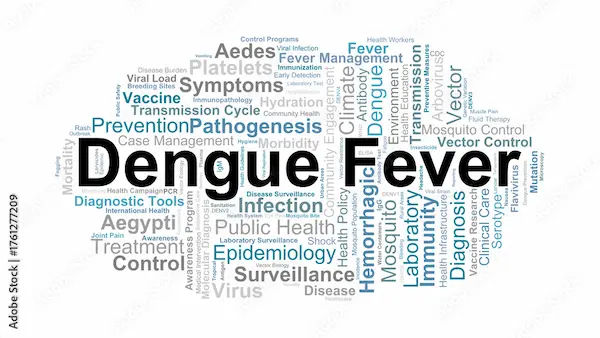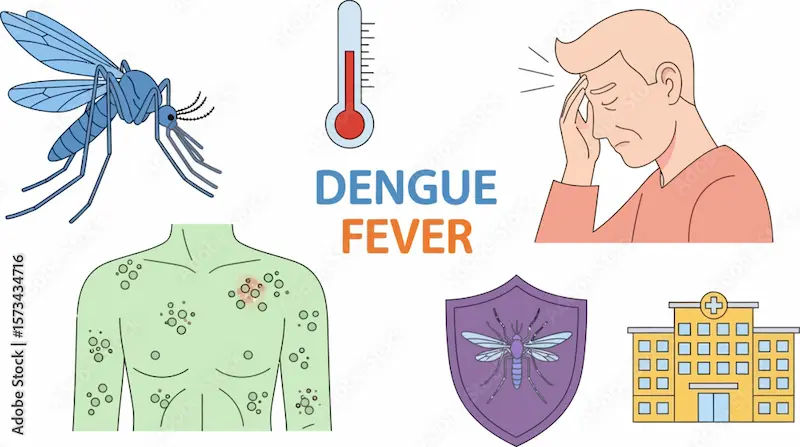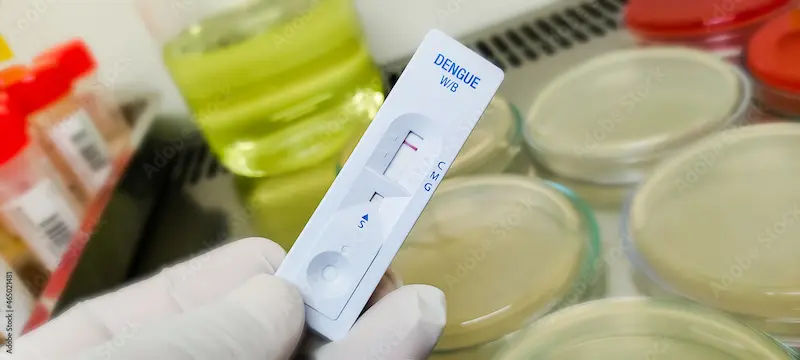Dengue Fever: Why Your Platelet Count Isn't the Whole Story
Understand why platelet count alone isn't the key to dengue severity, learn about warning signs, plasma leakage, and effective management.


Introduction
When dengue fever strikes, the first question on everyone's mind is often, "What's the platelet count?" This number has become a source of immense anxiety for patients and families. However, fixating solely on this one metric can be dangerously misleading. While a dropping platelet count is a known feature of dengue, it is not the primary determinant of severity. The real danger lies in a complication known as plasma leakage, which can lead to life-threatening shock. This guide moves beyond the platelet panic to provide a comprehensive understanding of dengue. We will explore what truly happens inside your body, identify the critical warning signs that demand immediate attention, and explain how the disease is effectively managed by medical professionals. Understanding this broader picture is crucial for navigating a dengue infection safely and rationally.
What Really Happens in Your Body During Dengue
Dengue is not a simple viral fever; it's a complex dance between the virus and your immune system. Understanding this process is key to seeing why platelet count is just one part of a larger, more dangerous picture.
The Virus's Attack and Immune Response
The dengue virus, transmitted by the Aedes mosquito, enters your bloodstream and invades white blood cells. It replicates, spreading throughout the body. Your immune system launches a massive counter-attack, releasing a "cytokine storm" of inflammatory signals. This is what causes the classic high fever, severe muscle and joint pains, headache, and rash. This initial febrile phase typically lasts 2-7 days.
The Real Danger: Plasma Leakage Syndrome
As the fever subsides, the patient enters the critical phase. This is not about the platelet count falling further; it's about the risk of plasma leakage. The inflammatory response makes the small blood vessels (capillaries) become "leaky." Protein-rich fluid (plasma) seeps out of the bloodstream into surrounding tissues. This causes:
• Fluid accumulation in the chest and abdomen.
• A drop in blood volume.
• A rise in haematocrit (the concentration of red blood cells as the liquid part of the blood is lost).
This plasma leakage is the hallmark of severe dengue and can rapidly lead to dengue shock syndrome (DSS), organ failure, and even death if not managed with urgent fluid resuscitation.
The Platelet Count Obsession: A Misplaced Focus?
The cultural focus on platelets is understandable but often overshadows more critical clinical markers.
Why Do Platelets Drop in Dengue Fever?
Platelets are small cell fragments crucial for clotting. In dengue, their count drops for several reasons:
1. Bone Marrow Suppression: The virus directly suppresses the bone marrow, temporarily reducing the production of platelets.
2. Increased Destruction: The immune system, while fighting the virus, may also destroy platelets.
3. Consumption: Minor bleeding and clotting events throughout the body use up platelets.
It's a natural consequence of the infection, and for most patients, the count will recover spontaneously as the infection clears.
Platelet Count is a Lagging Indicator
A key reason not to panic over a low number is that it's a lagging indicator. The platelet count typically continues to drop for 24-48 hours after the fever breaks and the critical phase of plasma leakage has begun. By the time the platelet count is at its lowest, the risk of plasma leakage may already be subsiding. Relying on it alone means you could miss the window for preventing shock. Consult a Specialist for the best advice
More Critical than Platelets: Key Warning Signs to Watch For
Doctors are trained to look for specific clinical signs that indicate a patient is entering the severe phase. These are far more important than any single number on a lab report.
Severe Abdominal Pain and Persistent Vomiting
Intense, continuous abdominal pain is a major red flag. It can be a sign of fluid accumulation in the liver or abdomen due to plasma leakage. Persistent vomiting (3 or more times in 24 hours) prevents adequate oral intake, worsening dehydration and making medical intervention for fluid replacement essential.
Signs of Plasma Leakage and Shock
Watch for these signs as the fever subsides:
• Cold, clammy skin and limbs.
• Restlessness or lethargy.
• A rapid, weak pulse.
• Narrowing pulse pressure (the difference between systolic and diastolic blood pressure).
These are signs that the body is going into shock due to lost blood volume, a true medical emergency.
Mucosal Bleeding and Other Red Flags
While spontaneous major bleeding is rare, certain types of bleeding are significant:
• Black, tarry stools (indicating gut bleeding).
• Vomiting blood (red or coffee-ground-like).
• Heavy menstrual bleeding or other unusual bleeding.
Any of these signs require immediate medical evaluation.
How Doctors Really Monitor Dengue: The Crucial Tests
Medical professionals use a combination of clinical observation and lab tests to guide treatment.
The Importance of Haematocrit (PCV) Levels
If platelet count is the celebrity, haematocrit is the behind-the-scenes hero in dengue management. As plasma leaks out, the blood becomes more concentrated, causing the haematocrit level to rise. A rising haematocrit is a direct, real-time indicator of plasma leakage and is a primary trigger for starting or increasing intravenous (IV) fluid therapy. Doctors track serial haematocrit measurements far more closely than platelet counts during the critical phase.
The Role of Serial Full Blood Counts
This is why doctors order blood tests every 24 hours. They are not just checking platelets. They are tracking:
• Haematocrit Trend: Is it rising, stable, or falling?
• White Blood Cell Count: A rising WBC count can often signal that the critical phase is ending and recovery is beginning.
This serial monitoring provides a dynamic picture of the disease's progression.
Effective Dengue Management; What Actually Helps?
Treatment for dengue is supportive care, meaning we help the body fight the virus itself while managing complications.
The #1 Treatment: Aggressive Hydration
The cornerstone of dengue management is fluid replacement. During the critical phase, oral fluids are often not enough due to vomiting or rapid fluid loss. IV fluids are administered to maintain blood volume and prevent shock. The type and amount of fluid are carefully calculated based on the patient's weight and, crucially, their haematocrit level.
The Truth About Platelet Transfusions
There is a common misconception that a low platelet count automatically requires a transfusion. This is not true. Prophylactic platelet transfusions (giving platelets "just in case" the count is low) are not recommended by the WHO and can even cause harm. Transfusions are typically reserved only for patients with active, significant bleeding or whose platelet count is extremely low (e.g., <10,000-20,000/cumm) and who are heading for an invasive procedure.
The Myth of "Platelet-Boosting" Foods
Papaya leaf juice, kiwi, pomegranate—while nutritious, there is no strong scientific evidence that these foods can significantly or rapidly increase platelet counts in dengue patients. The body will regenerate platelets on its own once the bone marrow recovers. The best dietary advice is to stay well-hydrated with oral rehydration solutions (ORS), water, and soups, and eat easily digestible foods. Focusing on these myths can distract from the paramount importance of professional medical hydration support.
When to Seek Immediate Medical Attention?
If you or a family member has dengue, go to a hospital immediately if you notice any of the following warning signs of severe dengue:
• Severe abdominal pain.
• Persistent vomiting.
• Bleeding from gums or nose, or in vomit/stools.
• Rapid breathing or breathlessness.
• Feeling extremely tired, restless, or irritable.
• Cold or clammy skin.
• A sudden drop in temperature without feeling better.
If any of these severe dengue symptoms appear, do not wait. Consult a doctor online immediately with Apollo24|7 for urgent evaluation or proceed to the nearest hospital. Timely fluid management is critical.
Conclusion
Dengue fever demands respect and informed vigilance, not panic centred on a single laboratory value. While a declining platelet count is a known characteristic of the illness, it is not the central story. The true plot revolves around the risk of plasma leakage during the critical phase. By shifting our focus from platelets to the more telling signs—severe abdominal pain, persistent vomiting, and clinical markers of shock—we can make smarter, potentially life-saving decisions. Effective management hinges on meticulous fluid replacement guided by medical professionals, not on unproven remedies or transfusions based on numbers alone. Trust the process, understand the signs, and prioritise timely medical care for a safe recovery. Consult a Specialist for the best advice
Consult a Specialist for the best advice

Dr. Mainak Baksi
General Practitioner
13 Years • MBBS , MD (MPH)
Howrah
Mainak Baksi Clinic, Howrah
(50+ Patients)

Dr. Rajib Ghose
General Physician/ Internal Medicine Specialist
25 Years • MBBS
East Midnapore
VIVEKANANDA SEBA SADAN, East Midnapore

Dr. Debdatta Pati
Psychiatrist
18 Years • MBBS, DPM, MD (PSYCHIATRY)
Kolkata
MCR SUPER SPECIALITY POLY CLINIC & PATHOLOGY, Kolkata

Dr. Bindu Suresh
General Physician/ Internal Medicine Specialist
15 Years • MBBS, MD
Bangalore
Apollo Clinic Bellandur, Bangalore
(50+ Patients)

Dr. Bimalbandhu Saha
General Physician/ Internal Medicine Specialist
40 Years • MBBS, DTM&H, Diploma in Maternity and Child Welfare
Kolkata
MCR SUPER SPECIALITY POLY CLINIC & PATHOLOGY, Kolkata
Consult a Specialist for the best advice

Dr. Mainak Baksi
General Practitioner
13 Years • MBBS , MD (MPH)
Howrah
Mainak Baksi Clinic, Howrah
(50+ Patients)

Dr. Rajib Ghose
General Physician/ Internal Medicine Specialist
25 Years • MBBS
East Midnapore
VIVEKANANDA SEBA SADAN, East Midnapore

Dr. Debdatta Pati
Psychiatrist
18 Years • MBBS, DPM, MD (PSYCHIATRY)
Kolkata
MCR SUPER SPECIALITY POLY CLINIC & PATHOLOGY, Kolkata

Dr. Bindu Suresh
General Physician/ Internal Medicine Specialist
15 Years • MBBS, MD
Bangalore
Apollo Clinic Bellandur, Bangalore
(50+ Patients)

Dr. Bimalbandhu Saha
General Physician/ Internal Medicine Specialist
40 Years • MBBS, DTM&H, Diploma in Maternity and Child Welfare
Kolkata
MCR SUPER SPECIALITY POLY CLINIC & PATHOLOGY, Kolkata
More articles from Dengue
Frequently Asked Questions
1. What is a dangerously low platelet count in dengue?
There's no fixed 'danger' number. While counts can drop very low (even below 20,000/cumm), the decision for a transfusion is based on whether there is active bleeding, not just the number itself. Most patients recover without needing a transfusion.
2. How long does it take for platelets to increase after dengue?
The platelet count usually reaches its lowest point around the time the fever subsides (days 4-7 of illness) and begins to recover spontaneously after that. It can take a week or two to return to normal levels.
3. Is papaya leaf juice effective for increasing platelets?
While some small studies suggest a potential benefit, the evidence is not conclusive enough for it to be a standard medical recommendation. It should not replace proper medical care, hydration, and monitoring for warning signs of severe dengue.
4. What should I eat to recover from dengue fever?
Focus on hydration with ORS, coconut water, soups, and water. Eat easily digestible, nutritious foods like khichdi, porridge, fruits, and boiled vegetables. The goal is to rest and let your body recover.
5. When is dengue no longer contagious?
Dengue is not directly contagious from person to person. The virus is spread through the bite of an infected mosquito. A patient is infectious to mosquitoes primarily during the febrile phase (first week). To prevent spread, protect yourself from mosquito bites during your illness.




